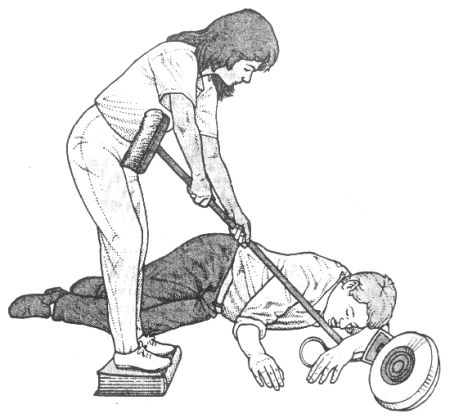| Page 5 |

|
|
1 - Electrical Safety
2 - Page 2 3 - Page 3 4 - Page 4 5 - Page 5 6 - Page 6 |

 |
How to Respond to Electric Shock
A small night-light with a 6-watt bulb draws .05 ampere, and even that small amount of current can be fatal. Here are some effects of current (in milli amps) passing through a 150 pound body (note that perception is only .5 to 1.5 milli amps):
Protect Yourself
- Don't touch the person. That person might be energized, so take time to protect yourself
- Don't try to use a conductive tool to free the person
- Don't touch anyone who has become grounded.
Call 911 for help, IF the person:
- is obviously injured such asloss of consciousness, significant trauma, etc.
- has an altered mental status i.e.confusion, slow and/or slurred speech, etc.
- has other obvious injury i.s. laceration, burns, etc.
- or at the discretion of the shocked victime or supervisor
Meanwhile...
- Keep others from being harmed
- Shut off the power (fuse or circuit-breaker or pull the plug; this might be difficult because there might be secondary sources; if you are not sure, get help.
- Move the victim to safety only when power if OFF and no neck or spine injuries are possible
- Give necessasry first aid
- Report accident to supervisor, even minor shocks and close calls must be reported.
- Secure area
- Collect data for investigation and to prevent reoccurence.
What To Do Until Aid Arrives:
Check for:
Pulse- IF person's heart has stopped, start CPR, if you are trained
- IF person isn't breathing, begin mouth-to-mouth resuscitation, if you are trained
- Keep person lying down
- If unconscious, put them on their side to let fluids drain.
- Don't move the person if neck or spine injuries are possible
- Cover the person to maintain body head
Stay with patient until help arrives
Inform medical personnal about patient conditions
If not emergency:
- Often symptoms are delayed and the person might need medical attention
- All persons, who have received shocks but do not fall into the categories above, must be taken to the Gannett Health Center by a co-worker or supervisor
- Medical EVALUATION is a must
| << Previous 1 2 3 4 [5] 6 Next >> |

